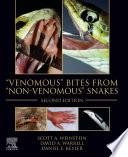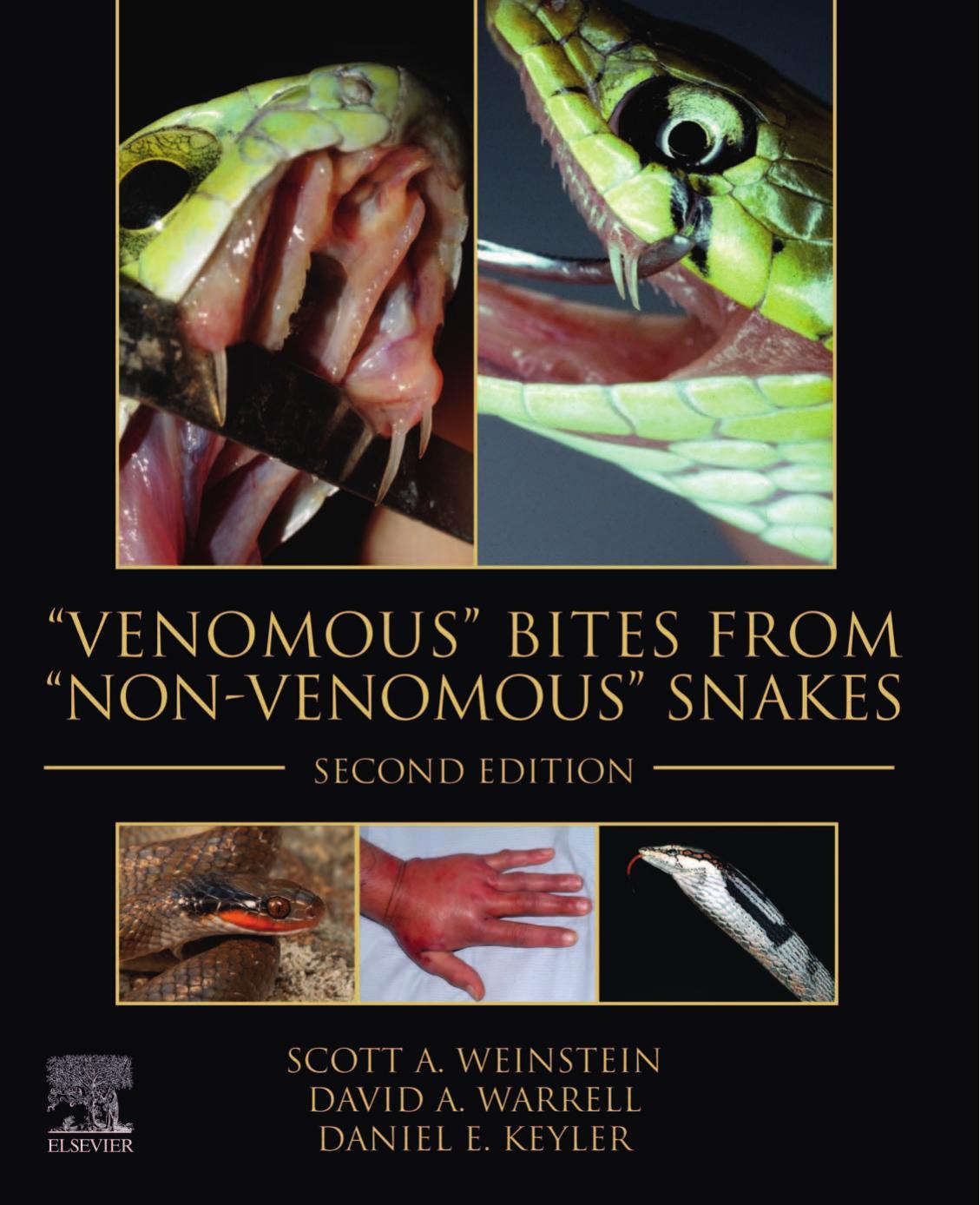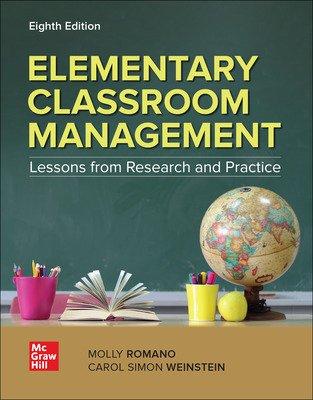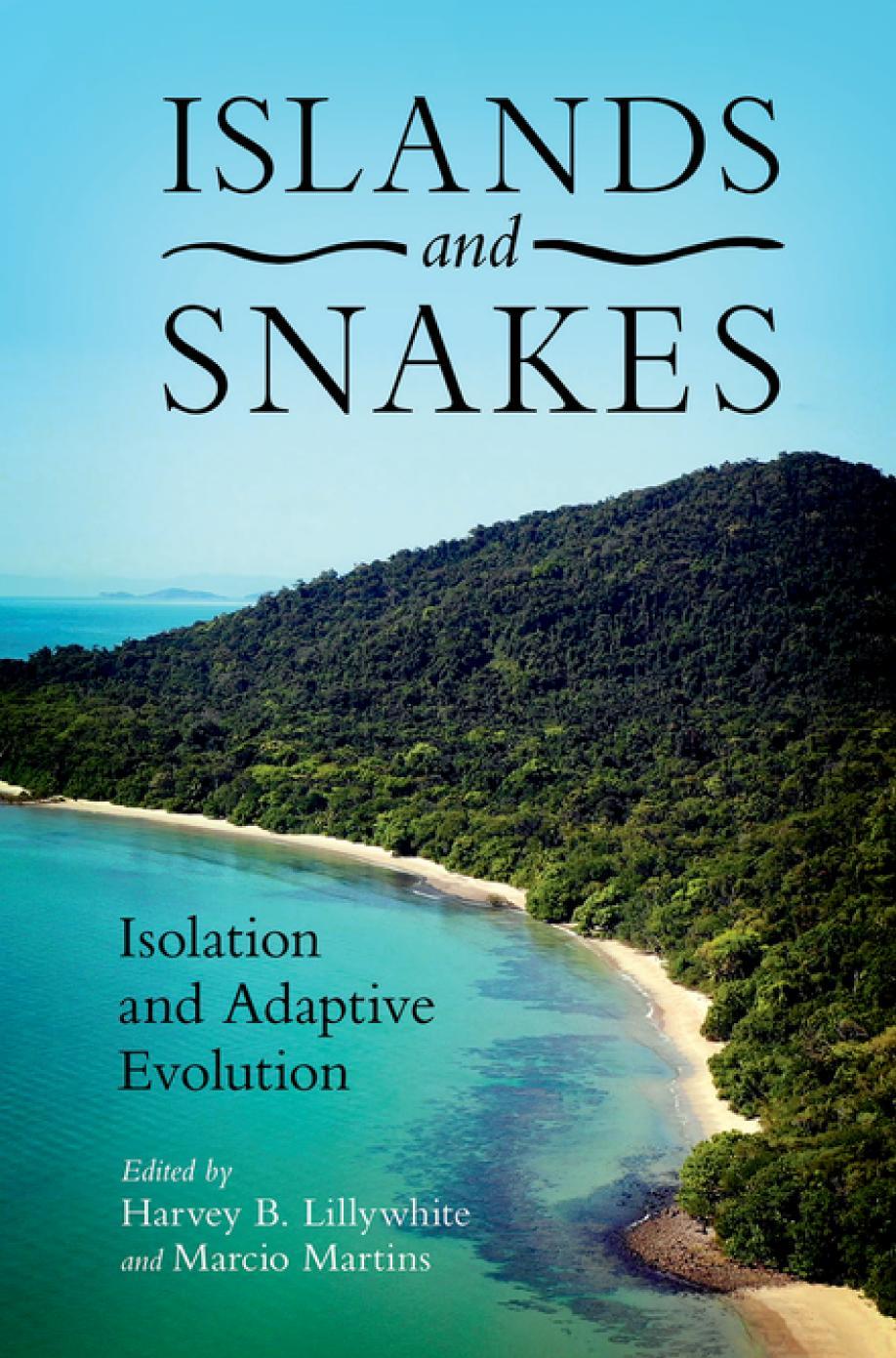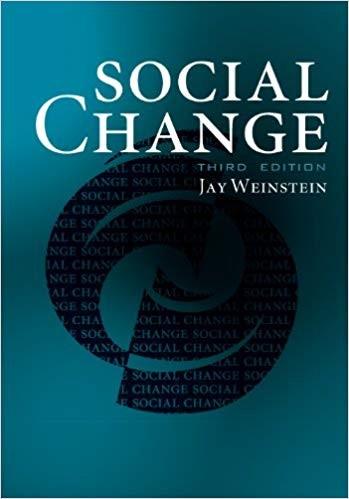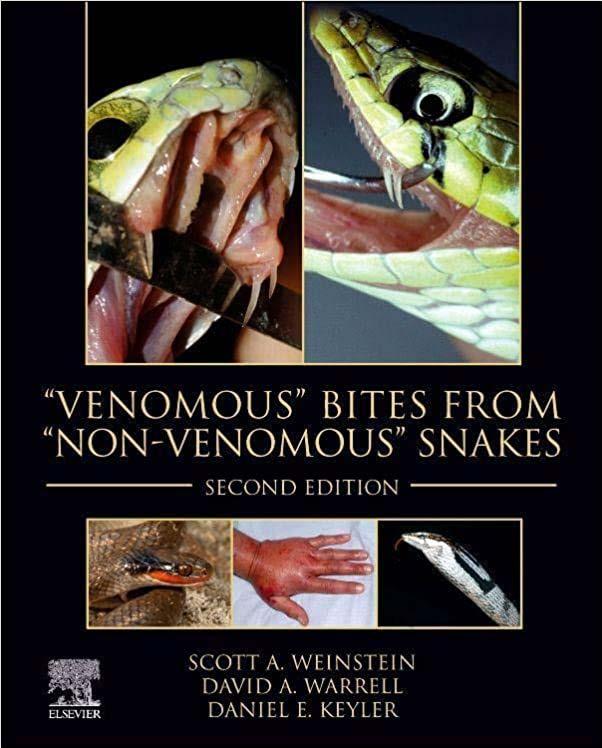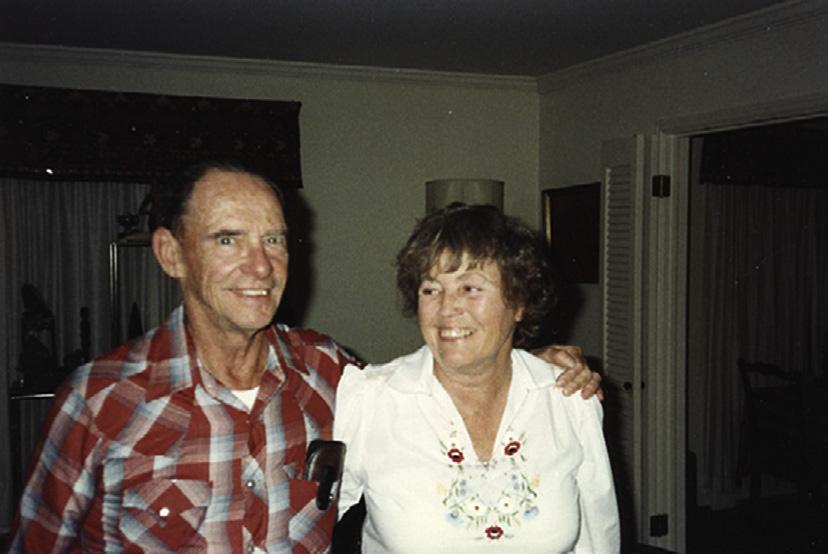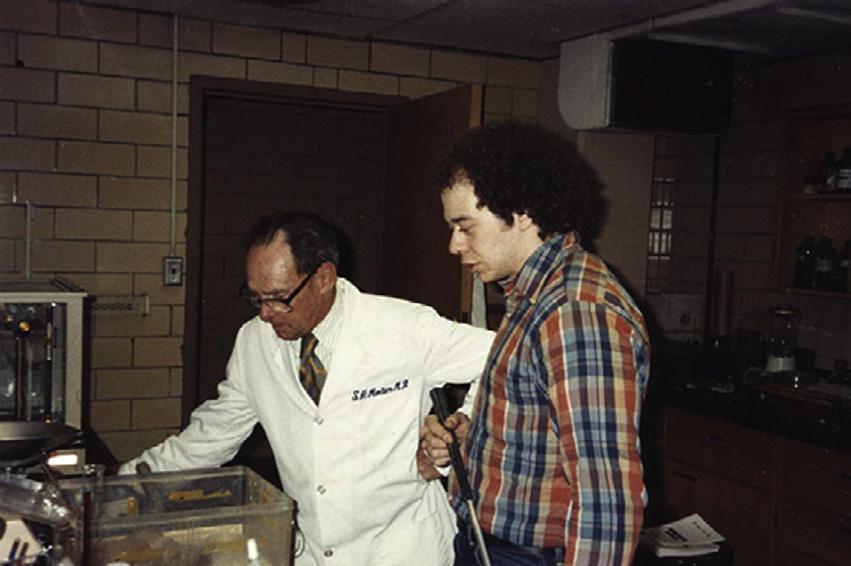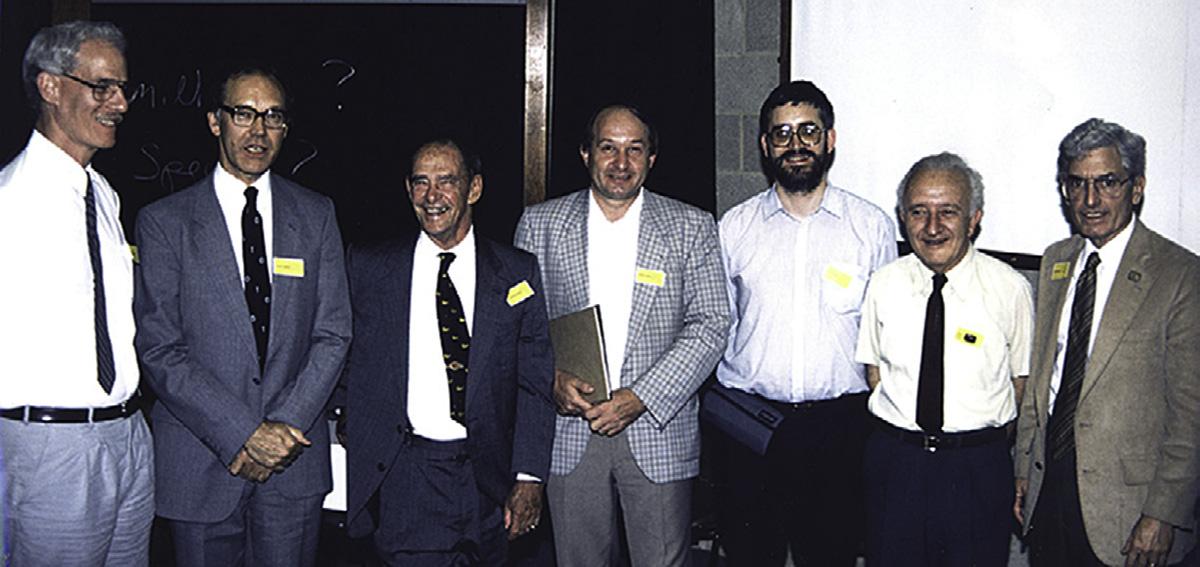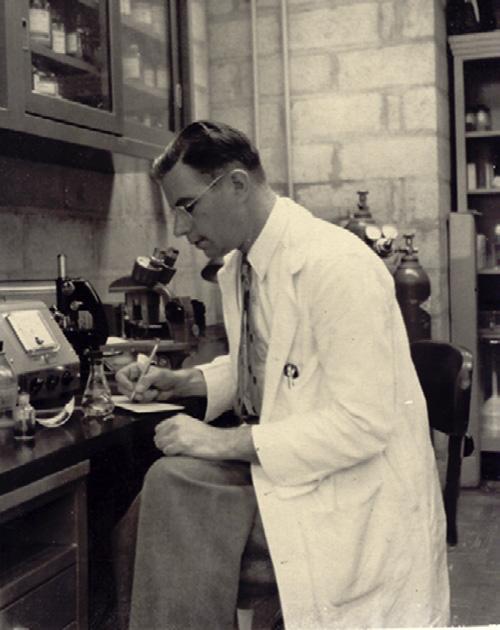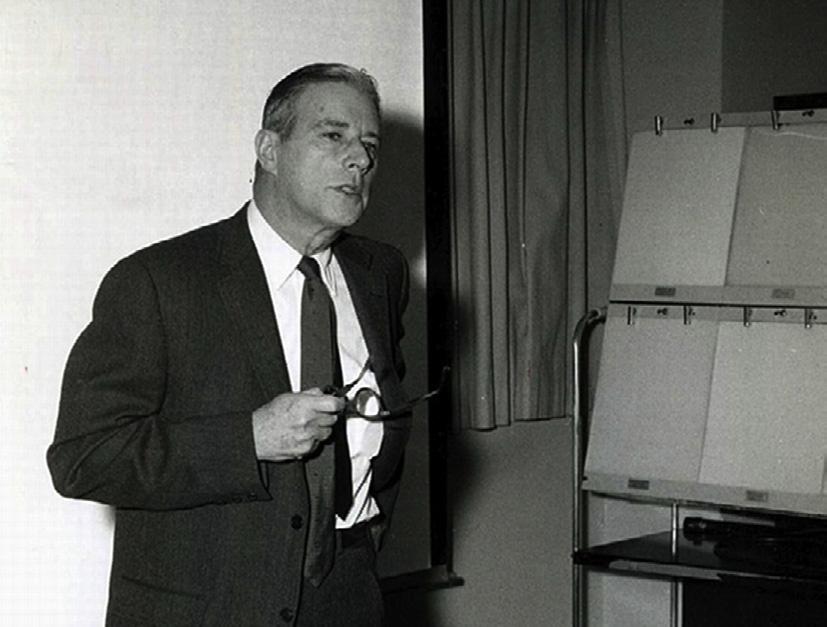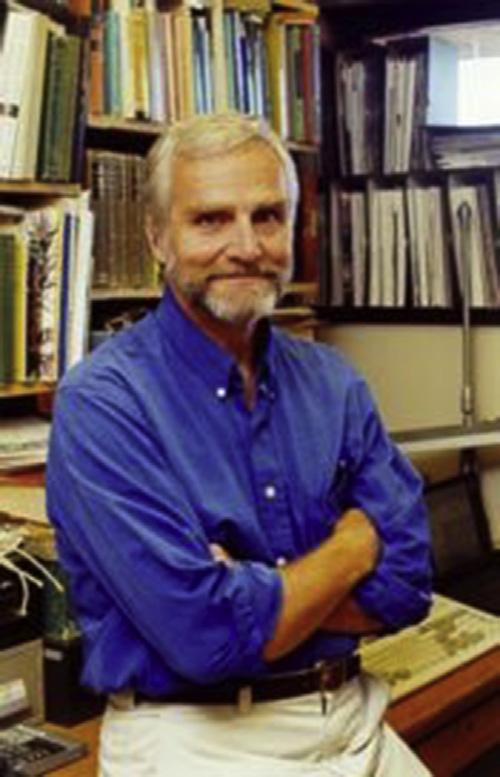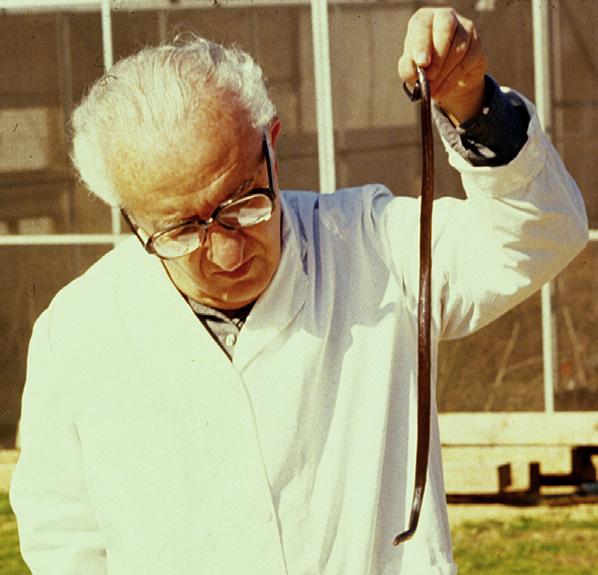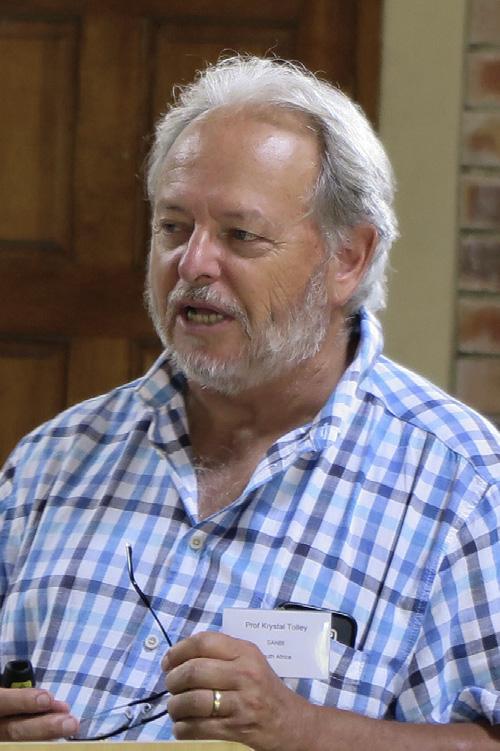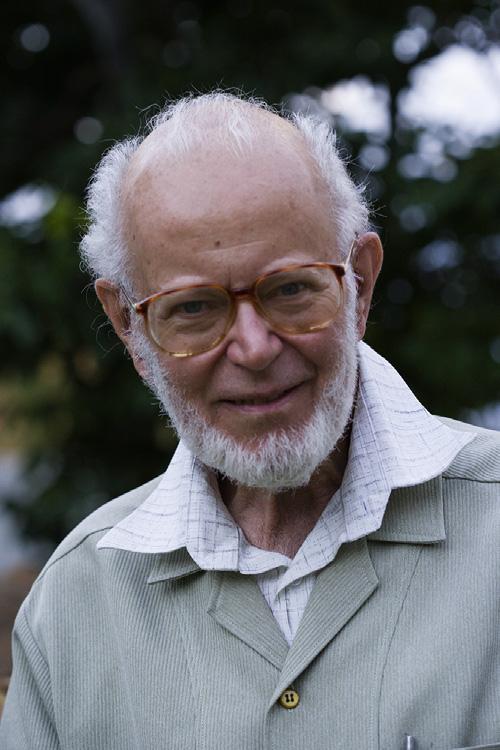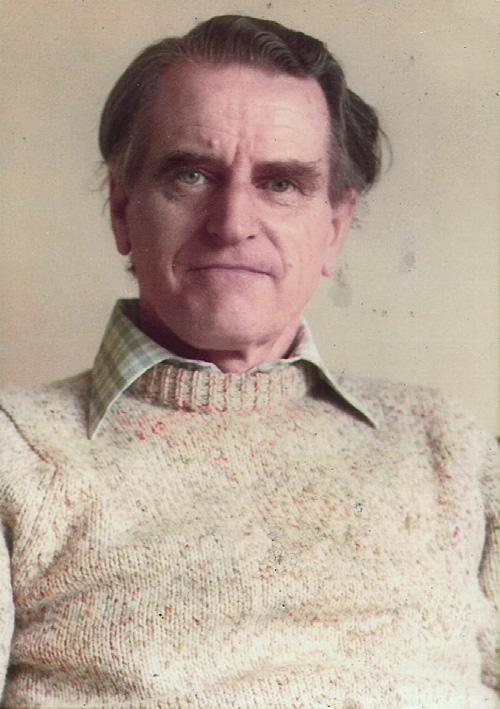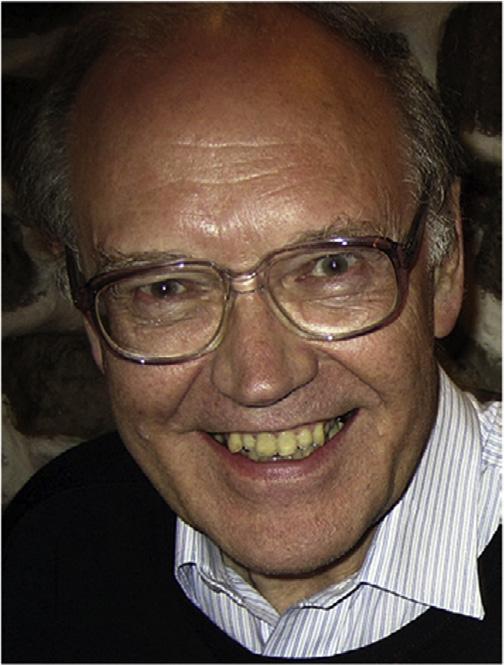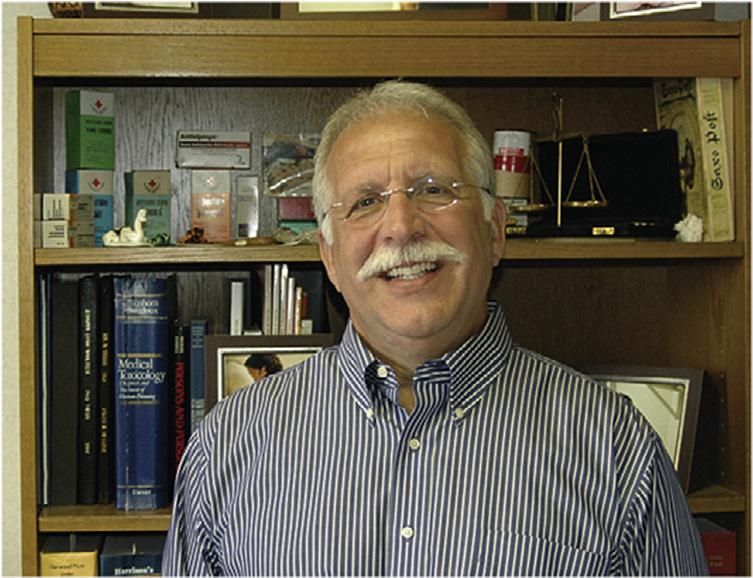Abouttheauthors
SCOTTA.WEINSTEIN,BA,MSc,PhD,MBBS,MD,DIP,ABFM, FAAFP
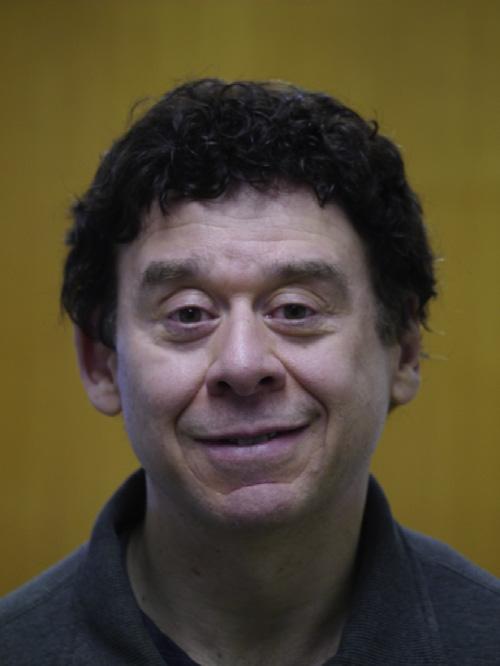
ScottWeinsteinwasconsumedfromearliestchildhoodbyaninterestinreptilesand amphibians.AmemberoftheNewYorkHerpetologicalSocietybyage11,hewas oneofaluckycadreofyoungmemberswhoweregentlymentoredbythe well-knowncuratoroftheStatenIslandZoo,thelateCarlKauffeld.Hisstudies of“rear-fangedcolubrids”startedinJuniorHighSchoolwherehestartedtocompare thesparseinformationintheavailableherpetologyliteraturewithcollectedliving specimens.Theseinterestsrapidlyfocusedonthebiologyofvenomoussnakes andherpetologicaltoxinology.ThisledtohisstudiesinherpetologywithProf. EdmundD.Brodie,Jr.atAdelphiUniversity(GardenCity,NY),whereheearned hisBAinbiologicalsciencesandcomparativereligion.Shortlythereafter,he becamethelateProf.ShermanA.Minton’slaststudentattheIndianaUniversity SchoolofMedicine,whereheearnedanMScinMedicalMicrobiologyandImmunology.HisPhDinMedicalMicrobiologyandImmunologywasearnedwiththelate Prof.AlanW.BernheimerattheSacklerInstituteofGraduateBiomedicalSciences ofNewYorkUniversitySchoolofMedicine(NewYork,NY),hisMBBSwasearned atFlindersUniversitySchoolofMedicine,Adelaide,Australia,andtheBoardof RegentsoftheUniversityoftheStateofNewYorkconferredhisMD.Hecompleted familymedicineresidencyatSouthNassauCommunitiesHospital,Oceanside,NY andservedaschiefresident.Healsocompletedtwopostdoctoralresearch
fellowships:oneatNYUMedicalCenterandtheotherattheUSArmyMedical ResearchInstituteofInfectiousDiseases(FortDetrick,Frederick,MD).His researchhasincludedpurificationandcharacterizationofnovelsnakevenomneurotoxins;elucidationofcomponentsandthebiomedicalpropertiesofvenomsand othersecretionsfromnon-front-fangedcolubroids;venomresistanceinophiophagousnon-venomoussnakes;andfieldstudiesofreptilesandamphibians.Herecently servedasaclinicaltoxinologistattheWomen’sandChildren’sHospitalinAdelaide, SouthAustralia,wherehewasaconsultantinthemanagementofenvenomationsand practicestraditionalfamilymedicineinhisnativeNewYorkCityandintermittently inthenorthernsuburbsofAdelaide.Inadditiontohislifelonginterestsintoxinology andherpetology,Dr.Weinsteinhasastronginterestinthemedicalmanagement ofspecial-needspopulations(e.g.,thosewithdisabilities),infectiousdiseases (especiallyacademicandclinicalvenereology),andsubstancedependencymedicine. Hestillparticipatesinfieldherpetologywheneverpossibleandhasalwaysremained activeinthecaptivepropagationofawidevarietyoflivingspecimens.Asiscommon withmanyherpetologistsandtoxinologists,healsohastraveledextensively.Hehas contributedmorethan100peer-reviewedpublicationsintoxinology,herpetology, andmedicine,aswellassixbooks.
DAVIDA.WARRELL,MA,DM,DSc,FRCP,FRCPE,HONFZS, FMEDSCI
DavidAlanWarrellisEmeritusProfessorofTropicalMedicineandHonorary FellowofStCrossCollege,UniversityofOxford,UK.AftertrainingatOxford, StThomas’Hospital,andtheRoyalPostgraduateMedicalSchoolinLondon,he lived,worked,researched,andtraveledinEthiopia,Nigeria,Kenya,SouthAfrica,
Thailand,Burma,SriLanka,Bangladesh,PapuaNewGuinea,Brazil,Ecuador,Peru, theCaribbean,andinothertropicalcountries,foundingtheOxfordUniversity-based TropicalMedicineResearchProgramme,whoseunitsareinThailand(since1979) andelsewheretostudymalariaandothermajortropicaldiseases.HebecametheDirectoroftheOxfordTropicalNetworkin1986andlater,headofTheNuffield DepartmentofClinicalMedicine,UniversityofOxford.HehasbeentheDelegate forMedicineandMusicattheOxfordUniversityPressandwassenioreditorof the OxfordTextbookofMedicine (fifthedition,2010)aswellasthe OxfordHandbook ofExpeditionandWildernessMedicine (firstedition,2008).Hehaspublishedmore than500researchpapers,articles,reviews,andtextbookchaptersonmalaria,rabies, relapsingfevers,meningococcalmeningitis,cryptococcalmeningitis,HIV,other tropicalandinfectiousdiseases,comparativerespiratoryphysiology,respiratorydiseases,herpetology,venomousanimals,envenoming,andplantandchemical poisoning.HeisaconsultanttotheWorldHealthOrganization(WHO)onsnakebite, rabies,andmalaria,theBritishArmy,theUKMedicalResearchCouncil,theForeign andCommonwealthOffice,theEarthWatchInternational(conservation),the ZoologicalSocietyofLondon,theRoyalGeographicalSociety,andtheToxBase UK.HealsoservedasthepastpresidentoftheRoyalSocietyofTropicalMedicine andHygieneandtheInternationalFederationforTropicalMedicine.Hisprincipal researchinterestremainsthepathophysiologyandtreatmentofenvenoming.In 2019,hewasawardedtheprestigiousSirPatrickMansonMedalbytheRoyalSociety ofTropicalMedicineandHygiene.
DANIELE.KEYLER,BS,BSPharmacy,PharmD,FAACT
Danhashadaninterestinvenomoussnakessincehisearlyyearsofgrowingupalong theTippecanoeRiverinIndiana.Thisenthusiasmwasfurtherintensifiedduringhis highschoolyearswhenhecaredforthesnakecollectionoftheeminentherpetologist,
Another random document with no related content on Scribd:
putting together the broken framework of the saw. After some hesitation Isabel joined him. Kneeling near his side she sorted out the shattered azulejos and succeeded fairly well in piecing them together.
"What shall we do with them?" she asked. "We have no cement. Besides, I am not sure that my father won't prefer to put them back himself. By the way, don't tell Mrs. Baxter what we've been doing."
"Give them to me," Antonio answered. And, having transferred them to a short plank, he carried the pieces off to his own cell and placed them in the cupboard. The damage to the two tiles was irreparable; but he resolved to puzzle out the secret of their manufacture and to make new ones in their stead.
"We can go now, can't we?" begged Isabel, when he returned to the chapel. There was a dutiful, almost daughterly, submissiveness in her manner which cooed to his pride more softly and winsomely than he knew.
"We can go," he said. "There will be time to take the path over the stepping-stones."
They relocked the chapel and mounted through the wood. Here and there its brown carpet of pine-needles was tawny with flecks and dapplings of mellow sunshine. In a patch of old garden, round an image of Saint Scholastica, they found autumn snowdrops, saffron, and sweet-smelling ranunculus. Overhead a blue gum-tree was in full flower, and all the while the wood hummed and thrilled with the diapason of the hidden torrent.
After they had crossed the stepping-stones Isabel halted, as if to absorb the loveliness of the rippling pool. Antonio remained silent, awaiting her good pleasure. Suddenly she said, without turning her eyes towards his:
"This is the place where I was so disagreeable yesterday morning."
He was too much surprised to reply.
"Isn't it?" she demanded.
"No," said Antonio. "It is the place, where, yesterday morning, we ... where we didn't get on together as well as before."
"It was all my fault," she persisted. "I had a silly fit of prudishness, like a young miss just home from school. All the time we were trying to talk I was wondering what you thought of me for asking you to meet me alone in a wood."
"English ways are different from Portuguese," suggested Antonio.
"Not so very different, after all," she said. "Ask Mrs. Baxter. Or, rather, take care that you don't say half a word to Mrs. Baxter about it. If you do she will swoon away with horror at the news of my brazen forwardness."
"If you will lend me your little ivory tablets," replied Antonio, "I shall be able to begin making notes of all the things I am not to mention before Mrs. Baxter."
"Be serious for a minute," she urged with a heightening of color. "Unless I can make you understand, we must not meet this way any more. If we mustn't, if we can't, I don't expect it will matter very much to you; but ... it will to me."
Her eyes met Antonio's. This time it was he who colored up and fell into confusion. The only reply he could think of was a stilted compliment.
"The Senhorita does me a great and an undeserved honor," he stammered.
"Don't," she commanded, with an impatient gesture. "When you talk like that I hate you. Be sincere. Besides, I'm not a Senhorita. If I were a Senhorita I should have jet-black hair and big sentimental eyes, and I should never walk more than a mile in my life, and I should no more dream of meeting you like this than of dancing on a boa-constrictor. Are you going to talk like that any more? If so, we'll go home this minute and you can do it on the way."
Antonio had met his match. If Isabel had been a man he could have met imperiousness with imperiousness, sarcasm with sarcasm, demand with demand, until he had established his will. But Isabel mastered him. He could only stand before her, like a refined and handsome José, awaiting orders.
"What you must understand is this," she said. "You have promised to come and talk to me now and then, while my father is in Lisbon. You've promised, and I want you to do it. I must talk to somebody sometimes, mustn't I? But I'd rather not have you at all than have any more times like Friday afternoon with Mrs. Baxter. You may think that, because she finished the story of her life on Friday, you've got the worst of it over; but you haven't. You've still to hear about the dear Marchioness of Witheringfield. Mrs. Baxter didn't know the dear Marchioness from Eve; but the tale will take an hour, all the same. Also, you've to hear how Mrs. Baxter lost the Baxter jewels, which she never possessed; and how she undermined her health nursing me through a month's fever, though it was really only a twodays' cold in the head; and how she rescued the little Viscount Datton from a burning house, which she never saw in her life. Don't think me spiteful. I simply can't stand it. Of course, you must put up with Mrs. Baxter once in a while; but, speaking generally, if you're coming any more to talk to me, I want you to talk to me here, at this pool, in the mornings."
"If I come here, to this pool, in the mornings," asked Antonio, who had recovered himself, "how do you know that I shan't inflict on you a string of histories as long as Mrs. Baxter's?"
Although he did not mean to fish for a compliment, his ears expected some pleasing reply; and he was a little crestfallen when she replied brusquely:
"Perhaps you will. Only don't you see, they will be histories I haven't heard fifty times already. Come to-morrow morning. Now we ought to be going. It must be close on four o'clock."
III
The next morning Isabel and Antonio conversed, to the accompaniment of the cascade's deep music, for nearly an hour. The morning following, their talk lasted eighty minutes. On the Wednesday Antonio again drank tea with Mrs. Baxter, who regaled him with the full story of the little Viscount Datton's escape from the blaze at Datton Towers; of his lordship's ingratitude and eventual marriage; and of the young Viscountess Datton's scandalous callousness when her consort broke his collar-bone in a steeplechase. On the Friday morning the monk met Isabel again at the pool. Business took him to Villa Branca on the Saturday; but Sunday afternoon saw him striding over the stepping-stones once more.
Although these sunny hours were seasons of delight and refreshment to Antonio's human spirit, they did not parch the springs of his Christly life. Every night he continued the pious practice of self-examination; and he was able, in all honesty and reverence, to justify himself by the example of his Lord. Diligebat Jesus Martham et sororem ejus Mariam, "Jesus loved Martha and her sister Mary;" and, on the eve of His passion he fortified His weary spirit for the last conflict by abiding quietly in Martha's and Mary's house. And, in this sense—diligebat not amabat—Antonio loved Isabel. He was drawn to her by silken cords of pity for a loneliness and lovelessness far worse than his own. He loved, with a fine spiritual sympathy unwarped by earthly passion, the brave, truthful ardent soul underneath the ice of her pride. No doubt he found a sensuous pleasure in the softness of her voice, in her ever-varying beauty, and in her never-failing grace; but these charms delighted him by reason of an exquisite fitness, like the fitness of richly embroidered vestments and pure golden chalices or monstrances in great acts of spiritual worship. He loved her with a sacred and not with a profane love.
Nevertheless, the monk knew that he was only a weak mortal, and that he had drifted into a situation rife with perils. He remembered that better Christians than he had made shipwreck of their faith through yielding themselves too confidently to feminine companionship. He recalled the solemn warning of Saint Paul: "Let him that thinketh he standeth take heed lest he fall." But, so far as his own safety was concerned, a single
consideration sufficed to reassure him. In a few days Sir Percy would return, and it was almost certain that he would bid his women-folk pack their chattels and depart before the second instalment of purchase-money fell due. Within a month, perhaps within a week, Isabel would pass out of Antonio's life. Once more he would have to settle down with José to their dull and lonesome grind, and probably years would drag away before he could hear an English voice again.
Antonio, however, was not selfish enough to think only of his own salvation and perfection. The situation had its perils for Isabel as well as for himself; and therefore he followed up his monk's self-examination by meditating, as a man of the world, on Isabel's interests. Although he would miss her sorely, Antonio was prepared to surrender her, when the time came, without a murmur, as he had learned to surrender many lesser delights before; but was Isabel equally able and willing to surrender Antonio? She was young, she was lonely, she was deeply affectionate as only a reserved woman can be; so was he doing right in occupying her thoughts more and more? After striving to act like the very soul of honor towards the slow-witted and shallow Margarida, was he not in danger of behaving dishonorably towards this finely-tempered, deep-hearted lady?
These questions suddenly pressed themselves upon his conscience with so much ardor as he was crossing the stepping-stones on the second Sunday afternoon that he halted in the midst of the spray from the cascade and almost resolved to turn back. But he decided that there was no cause for alarm. In Isabel's view the difference in their stations must surely repress any rash outgoings of her maiden fancy. The da Rochas could boast a longer and a less dubitable pedigree than the Kaye-Templemans; but Antonio had perceived among the English a disrespect for all aristocracies save their own. Besides, Isabel knew not a leaf or a twig of his family tree. To her he was a self-made man, a yeoman working with his own hands. Educated, traveled, interesting, ambitious, refined he might be; but, in the social scale, he was still a yeoman before the eyes of Isabel.
No. Surely there was no peril, no need to turn back. At not one of their meetings by the pool-side had there been the slightest approach to sentimental interchanges. They had talked of a hundred matters. Portuguese,
English, and universal, and Isabel had gone so far as to tell a score or two of intimate experiences from which Antonio could rebuild the gray history of her unpeaceful life. But there had been no more personal explanations, no more half-quarrels, no more uncontrolled glances or blushes, no more of anything outside the frank good-fellowship of fast friends in the first flush of friendship. So Antonio did not turn back.
Isabel appeared at last, holding out some papers. A post had arrived from Lisbon, bringing the news that Sir Percy was much better. As the burnt hand was still useless, Mr. Crowberry had written out the bulletin; and, enclosed with his letter to Isabel were two for Antonio. The first, from Crowberry père, contained little more than compliments and thanks; but the second, in the loose handwriting of Crowberry fils, was more interesting. It ran:
Dear Joligoodfellow
IhopethiswillfindyouwellasitleavesmeatpresentthankGodforit.
Now that the alujezos (or ajuzelos, or azelujos) are safe, isn't it time you took a holiday? Why not come back to England with Sir Percy and Isabel? I don't expect they'll stay in Portugal.
I will bet a guinea that you've either quarreled with Isabel or that you haven't. When you write, don't forget to say what you really think of her.
Give my love to that Excellent Creature Mrs. Baxter. Also to the Baxter jewels. Also to those monsters of ingratitude, inhumanity, and impiety Miss Sophia Baxter and the Viscount and Viscountess Datton. Also, if you dare, to Isabel. And accept the same yourself from
Your most respectful and obedient TEDDY CROWBERRY.
It occurred to Antonio that in neither of the letters was a date given for Sir Percy's return to the guest-house. He was on the point of asking Isabel whether it was mentioned in Mr. Crowberry's bulletin; but he saw that the question could be interpreted in an uncouth sense, and therefore he did not put it. The answer, however, was writ plain in Isabel's face. He swiftly analyzed her cheerfulness into two principal components—her thankfulness for Sir Percy's improved health and her relief at the prolongation of her liberty. Isabel's laugh was more free and gay. She seemed to be more of a girl and less of a woman. Indeed, for a few minutes, she became almost a child. For a while she stood hurling stones into the heart of the waterfall, as into the white down and iridescent feathers of a great bird's breast; and as soon as she wearied of this exercise she began to sail boats of cork-bark down the hurrying waters of the pool, scolding or encouraging her favorite as if it had been alive.
When Isabel at last sat down she demanded, with her usual abruptness:
"Why have you never told me about the Portuguese ladies—about the senhoritas? I'm tired of Dom Miguel and Dom Pedro, and Affonso Henriques and the Cardinal-King. As for growing grapes, by this time I know as much about it as you do. Talk to me about the senhoritas."
"What can I say about them," objected Antonio, "except that they are exceedingly beautiful, exceedingly virtuous, and exceedingly charming."
"And exceedingly dull," she said. "But be serious. Answer me. Is it true that Portuguese men are only half Christians? Is it true that, where women are concerned, you are out-and-out Moors? Don't you all look on women either as toys or as slaves?"
"If young Mr. Crowberry were here," retorted Antonio, "he would tell you how we tie up the ladies of our harems in sacks and drop them into the Tagus."
"I'm glad young Mr. Crowberry is hundreds of miles away," she declared. "When I've the patience to listen to him, I admit some of his satire is clever. But he bores me. I mean, he annoys me. I suppose it's because we've both got yellow hair."
"You have not got yellow hair," said Antonio.
"Never mind what sort of hair I've got. Tell me about the senhoritas. How do they spend their time?"
"Perhaps they could answer themselves—though I doubt it," he said. "People say they eat and drink and sleep; they dress and go to church; and, the rest of the time, they look out of the window."
"Is it still true," she asked, "that their ... their suitors come and stand under the windows at night, for hours at a time, with guitars?"
"Not always with guitars," explained Antonio, "but the rest is still true. If you want a senhorita you must stand under her window, night after night, for months, wet or fine. When her window is on the third floor you get a crick in the neck."
"But what do they talk about?"
"Nothing. They make eyes."
Her questions ceased, and the monk hoped that they were finished with a risky topic. Suddenly, however, she turned upon him and blurted out:
"Do you have to crick your neck for Margarida?"
Antonio jumped. The question struck him entirely dumb. Margarida! At first he could only stare at the questioner blankly. Then his stung pride made itself felt. The blank stare gave place to a flash of indignation. Her eyes quailed before the angry fires in his.
"No," he said, slowly and coldly. "I do not have to crick my neck for Margarida."
Isabel's face showed that she was troubled and almost frightened at what she had done. But he made no haste to condone her offense. He was capable of forgiving the injury almost as soon as it was committed; but he could not so easily surmount his disappointment at hearing anything like indelicacy from her lips. Graver still was this sudden revelation that Isabel did, after
all, think thoughts of him as a lover and a marrying man. And it gradually dawned upon him that there had been something nervous in her gaiety from the moment of her bringing the Crowberry's letters. He understood at last that she had come determined to probe him with her sudden question.
He got up and moved away a few yards to a point from which he could see the Atlantic; and there he stood, taking scrupulous counsel with himself. Was it or was it not his duty to make a fresh draft upon the candor with which he had ended the match-making of Senhor Jorge? No. It was not. Yet something had to be done. What hint ought he to drop, or what counterstroke ought he to deliver? For one foolish half-moment he almost entertained a mean plan of letting Isabel believe that there was indeed something between himself and Margarida.
"I am so sorry," murmured a soft and penitent voice almost in his ear.
After long indecision he asked, in dry tones and without turning to look at her:
"What made you say it?"
Her pause was longer than his. At length she answered:
"It wasn't idle curiosity."
"Then what was it?"
"I hardly know. Only it ... It seemed so dreadful."
"Dreadful?"
"I mean," she explained hastily, "it would be dreadful if you made a marriage like that. To say so is unpardonable impertinence on my part, no doubt. But, to be perfectly frank, I ... well, I suppose I've idealized you a little. You're not like other people I've met. And it shocked me to think of you settling down and, so to speak, giving up the fight."
"What fight?" asked the monk, not willing to help her out.
"Fight is the wrong word. Never mind. You know what I mean. Of course, this Margarida is good and domesticated and she'll make some farmer or tradesman an excellent wife. But can she read or write? Has she more than three ideas in her head? Could she talk with you, or understand you, or even sympathize with you, in anything that matters?"
"I suppose she could," said Antonio. "The simple things of life are the things that matter."
"To simple people, certainly. But you are not simple. You are complicated. Your teeth are easily set on edge. You are sentimental, romantic."
"I am sentimental? I am romantic?" he echoed, with an unfree incredulous laugh. "You are the first to find it out."
"It's true, all the same. What about that shut-up dismal monastery down there? Haven't you woven more romance around it than any ladye ever wove around her dead knight? What about the azulejos? Aren't you you as sentimental over them as any love-sick youth over a withered rose or a lock of hair? Why, you were ready to quarrel with us all, your old friends included, for the sake of a sentimental memory."
"Tell me," the monk demanded, turning to read her eyes, "what do you know about Margarida? What have you heard? Who has been talking to you?"
She was silent.
"From whom have you heard Margarida's name?" he insisted.
"You will think very badly of me," she confessed. "I heard it from Fisher, my maid. Oh, yes! look scandalized by all means. I don't care. The poor girl is in exile. Joanninha, our Portuguese cook, doesn't know much English, and she's old enough to be Fisher's mother. Mrs. Baxter never speaks to Fisher except to scold her or order her about. If I didn't let her chatter now and again to me, she'd go mad. Not that I listen to half she says;
but I should be telling you a downright lie if I pretended that I didn't prick up my ears when she began about you and Margarida."
"What did she say?"
"Very little. Only that Joanninha had been gossiping in the village shop, and that somebody had said something about the Senhor Oliveira da Rocha marrying this Margarida."
Antonio relapsed into moody silence. The news that his name was still being linked with Margarida's filled him with chagrin, if only for the sake of Senhor Jorge and his family. When, however, his thoughts came back to Isabel he softened. He saw no reason for doubting that she was disinterested in dreading the disaster of his union with an unlettered and unintelligent country lass, and he was unconsciously flattered by her generous recognition of his finer temperament. Isabel, waiting at his elbow like a repentant child, felt the softening; and, plucking up fresh courage, she said:
"You haven't told me yet if it is true. You've only told me that you don't crick your neck."
"Which do you think?" asked the monk rather sharply. "Do you believe this gossip or not?"
"I don't," she replied, without hesitation. "But ... there's just one thing that might make me credit it."
"What is it?"
"Well. This Margarida is certainly very pretty. She has an adorable color and wonderful eyes, and she wears her mantilla beautifully. Besides—"
"But you've never seen her," interrupted Antonio in alarm.
"Yes, I have. This morning. In church. At Mass. Why weren't you there? I thought you were obliged to go. I went with Joanninha. Don't ask me to say that I liked it. The gilded wood and the crude colors hurt my eyes, and the music was fearful. I couldn't understand a word of the sermon and I
didn't know what they were doing at the altar, so I had to pass the time looking at Margarida. If I were a man, I could fall in love with her."
"You went to church?" repeated Antonio, bewildered. Throughout their many talks during the week he had avoided the subject of religion. He had seen that it ruffled her, and he preferred not to discuss it until they knew one another's first principles and prejudices in less weighty matters. But he had not once failed, night or morning, to commend the work of Isabel's conversion to Our Lady of Perpetual Succor, or to pray that he might become the instrument of the Holy Ghost therein.
"Why did you go?" he asked. "To look at Margarida?'
"Most decidedly not," she retorted with spirit. "I didn't know who the pretty girl in the mantilla was till I came home. Fisher only told me this gossip two hours ago."
"Then you went to church to see what it was like?" he persisted, hoping, nevertheless, that there was some better reason.
"I went because I wanted to," she answered. "But come back to the point. Is it true about Margarida?"
He had gradually become aware of a new sympathy between them. All the resentment and distrust faded out of his heart. His gaze sought hers; and not until he could look down into her eyes did he answer:
"It is not true. It never was. It never will be."
The last syllable had hardly sped clear of his lips when the monk was struck dumb by the truth. It flashed from Isabel's radiant eyes like a flaming sword into his heart. A moment later she had turned away her face; but she could not hide the magic roses, the great crimson roses, which sprang to full bloom upon her cheeks. He knew her secret; and she knew that it was known.
To cover her trouble and confusion, she moved to find her little gloves and the embroidered bag. Antonio stooped down before her and was the
first to pick them up; but she snatched them almost roughly out of his hand.
"We've stayed too long," she said. "I must go."
In a twinkling she had crossed the stepping-stones and was in full flight for home. No wood-nymph pursued by a god of old ever flew with more gazelle-like grace; and the ravine seemed shorn of nearly all its beauty when the trees hid her from Antonio's eyes.
IV
On Monday morning, although he had business in Navares, Antonio was early at the pool. Throughout a sleepless night his moods had wavered from bitter self-reproach to laborious self-justification. But, amidst all the waverings, one decision stood firm. He must see Isabel at once. He must not run away. He must not tolerate, either on his part or on hers, any spurious delicacy, any eluding of a thorough understanding.
Try as he would Antonio could not wholly close his eyes to the grim humor of the situation. Within the narrow space of three weeks two young and handsome heiresses had thrown themselves at his, a monk of Saint Benedict's, head. But, while this oddity brought a bitter smile to his lips, he was not able to take pleasure or pride in events which were bringing pain and humiliation to others. The feeling uppermost in his heart was one of shame and sorrow for his indiscretion and weakness in meeting Isabel so secretly and so often.
About half-past ten she came, looking pale and rather frail. But she had nerved herself for the ordeal before her, and she was calm and selfcontrolled.
"I knew you would come," she said quietly. "Yet I feared you wouldn't. Early this morning I nearly sent Jackson down to the farm with a note; but I
didn't want people to talk."
"I came nearly an hour ago," the monk replied. His tones were so grave and his manner so solemn that a flush of resentment rose to her cheek.
"Don't make things worse than they are," she cried angrily. "Aren't they difficult enough already? You won't help matters by looking and speaking as if you've come to a funeral."
Antonio could not retort that he was indeed standing by a graveside and that he had come to drop a farewell tear upon their dead happiness. He waited for her next words.
"We're obliged to talk out our talk whether we like it or not," she continued, turning her back upon him and tearing at the fronds of a young mimosa. "I'm not an actress. I can't pretend that I don't know what we both know perfectly well. You can; but I can't. If I left it all to you, I suppose you'd tell me some more about the Emperor Pedro, or about sea-sand grapes. You'd be perfectly polite and, as you imagine, perfectly considerate; and you'd go back to the farm at twelve o'clock."
"I came here," answered Antonio, "expressly to talk and to listen without a moment's false delicacy or a shade of pretense."
"Thank you," she said, with a tinge of irony.
Her slender white fingers were still wantonly busy with the mimosa. The monk racked his wits desperately for an opening sentence. He would have preferred the easier task of facing Senhor Jorge and Donna Perpetua and Sir Percy and Mrs. Baxter and the Visconde de Ponte Quebrada and Queen Victoria's Comptroller and the Fazenda official all combined. Words refused to come. But it fell out that his dumbness was all for the best.
"Listen," said Isabel, without turning around. "You don't expect me to find this interview very delightful, do you? You'll admit that it's easier for me to talk about usurpers and bunches of grapes than about ... than about all this. I'll tell you what I've done. Perhaps I've done wrong, as usual; but I can't help it. I'm going to give you a letter—I mean a paper, a scribble.
Some things are so much easier to write than to say. After I've given it to you I'm going away for a walk. I shall come back in half an hour. You may open my little bag. It is in there."
Antonio loosened the cords of the silken pouch with respectful hands. It contained the damascened key of the chapel, a tiny lump of shining felspar picked up from the path, a pair of fine gloves, two or three small coins, and a folded paper. As he drew the paper forth, a snapping of twigs made him look up. Isabel was breaking her way through the trees.
His hand trembled as he unfolded the document. It was a quarto sheet filled from top to bottom with Isabel's fine writing. The monk glanced down the hill to make sure that she had come to no harm; and as soon as he caught sight of her walking quickly along one of the woodland paths, he sat down on a warm boulder and began to read these lines:
Four years ago you and Mr. Austin Crowberry visited the Earl of Oakland. You dined at Castle Oakland, and stayed all the next day.
The Countess of Oakland is my aunt. I hardly ever see her, because my father quarreled with the Earl nearly twenty years ago. But the Earl has a niece, Lady Julia Blighe, whom I met in London a few days after you went away. Perhaps you remember her. She is a little over-magnificent, and wears too much jewelry at once; but people go mad over her, and some say she is the most beautiful woman in England.
You made a most extraordinary impression on Lady Julia. She admitted giving you a flower. I grew tired of hearing about you—nearly bored to death. At first she caused me to picture you as a beautiful Byronic hero, with a Great Grief or a Dark Secret; and I detest all that sort of trash and gush. But one day, while she was chattering, a miracle happened. I can't describe it. Perhaps it was like someone throwing wide a door that had always been shut, or setting free a bird or animal that had always been caged. All in one moment you became the most important fact in the world. Why? How? I don't know. I thought I knew you through and through. Often
I could have said to Lady Julia: "No. That's all wrong. You know nothing about him."
I can't explain it. I am simply telling you the fact. From that time you haunted me. I became absolutely certain that our lives, some day, would meet; more certain than I am of the sun's existence and the moon's. When Mr Crowberry told me of the plan for buying this place, and my becoming your neighbor out in these wilds, I ought to have been overwhelmed by the astonishing coincidence; but it seemed as natural and inevitable as the sunrise.
At the first moment—no, not the first—I mean, the second moment of our meeting at your farm, I was mortified because you tried to look at me before I could look at you. Why did you do it? It was unkind. I had been thinking of you for four years; but you, if you thought of me at all, couldn't have thought of me more than four days. Yet, although you were in such a hurry to beat off my eyes, I saw in an instant that you were exactly as I had imagined you. Oporto and the Douro were not in the least like the engravings they showed me in England: but you were my dream come true. And all the time I sat on your right hand at dinner, I felt as if I had known you for years and years. You are not as clever as I expected; but you are gentle, and I am not one bit afraid of you.
We nearly quarreled about monks and about the azulejos, did we not? Still, it was only on the surface. You think I make too little of religion; I think you make too much: but we have agreed quite amicably to differ. Deep down in our hearts we are at one.
Since the day my father went to Lisbon I have been happy, for the first time in my life. You left me to make all the approaches; but I was very, very happy until Fisher mentioned Margarida. Last night I ached and burned with shame, because I had let fall the veil from my heart. But this morning I am glad and thankful.
You are not like other men. And I think I am not wholly like other women. As soon as you have read this paper we are going to tear it into thousands of pieces. So I will be bold. Mine is not the only secret that is out. I know you love me, my friend, my only friend in the world.
Antonio paused in his reading. For a moment he felt an immense relief at learning that he was not to blame. But he reminded himself that his blamelessness did not help Isabel one whit. Here was a mystical passion, an inscrutable supernatural love. No one could explain its beginning, no one could foretell its end. Only by a great effort did he resume the reading of the paper. It continued:
So much for the past. Now for the present and the future. What are we to do? Don't be hurt, dearest friend, if I write bluntly about practical matters.
There is a difference in our stations. I suspect that your blood is really nobler than mine and that your escutcheon is less tarnished; but, from the point of view of my friends, this will be a misalliance. Don't be angry. I mention it only to bid you disregard it. I have pondered it well and it weighs less than a sparrow's feather. I am nothing to the people in England; and they shall be nothing to me. Tell me, though; was it this that held you back from wooing me? I believe it was; and that is why the advances came from my side. But, after this, remember! You must court me, woo me. If I command it, you must crick your neck for me, as if I were a Senhorita.
And now about my father. You may fear that it will be a blow to him. Certainly it will amaze him and disconcert him. But if you were not in the case, my friend, I should have to amaze him and disconcert him some other way. So long as I and Mrs. Baxter and Jackson are with him, he doesn't realise the flight of time. He thinks of me as a little girl, and of himself as a man of forty who must needs be up and doing. He has fought his hard fight and he deserves his rest. More. He needs it. The Navares doctor says he will go out like a candle in a gale if he does not surrender. Whatever you may think, I love my father; and, even for your sake, I would not leave his side if it were not wholly for his good. God knows I am honest in this and in every word I have written. ISABEL.
Mechanically refolding the sheet, Antonio rose to his feet and drew a deep breath. In a few minutes Isabel would return. She would steal as shyly as a young deer through the branches. She would expect him to spring towards her, to clasp her in his arms, to murmur proud words of possession, to lavish in her ears his long-hoarded treasure of love-words, to press kisses on her hands, her cheeks, her eyes, her hair. Like a terrifying tocsin her words clanged in his brain: "My friend, my only friend in the world, you love me!"
He turned his gaze towards the Atlantic. But the day was growing sultry. Thunder was in the air and mists hid the great waters. He dared not look into the woods lest he should espy the slender figure tripping towards him. And somehow he could not lift up his eyes and his heart to heaven. In this cruel issue his inborn instincts of a courtly gentleman wore down his acquired habits of piety, until it savored of a coarseness or of a lapse from honor to breathe a word of this rare ladye's secret, even into the pitiful ears of God's saints and angels. Thus earth and sea and sky alike failed him. He closed his eyes.
Suddenly a rosy light and a delicious perfumed warmth seemed to suffuse his body and soul. Of course. His way was plain. God had frozen his cry for help upon his lips because it was no longer God's will that he should mortify his manhood in dogged fidelity to obsolete vows. He had vowed his vows in the belief that the Order would continue, and that he would live and die in its midst, upheld by its hourly discipline and devotion. He had not left the Order: the Order had left him. For seven years he had labored to restore it, and he had failed. He was free.
Free. Free to be as other men, free to hail the most wonderful and beautiful of maidens, free to exult over her, free to receive her marvelous love and to give it back a thousand-fold. He opened his eyes, and involuntarily held out his arms.
With bent head Isabel was picking her way up the slope. Her exquisite hands held her pretty dress of sprigged muslin clear of the thorny undergrowth. Sunbeams played with her golden ringlets. Antonio watched her with a sense of intoxication. This lovely girl was his, body and spirit, all his.
She drew nearer until he could see the blue of her large eyes, the peachbloom of her soft cheeks. Then, with the suddenness of an earthquake, the greatest miracle of his life befell.
Hundreds of times in the past, especially at seasons of abounding faith and high ecstasy, he had prayed that the Blessed Virgin would fly to his relief if ever he should weaken in this most perilous of his vows. "Pray for me, O Mother of mothers, O Virgin of virgins!" he had cried again and again. "Pray for me whenever I cannot, or will not, pray for myself." And, as Isabel parted the branches behind the mimosa, those hundreds of old prayers were answered. Celestial fire and supernal power filled his whole being so suddenly and mightily that he was conscious of a physical pang, of a roaring in his ears like rushing winds and resounding waters, of a great brightness before his eyes.
VThe heat of conflict and the flush of victory had wrought so great a change in Antonio's expression that Isabel started when they came face to face. But she interpreted his transfiguration as an ecstasy of love and joy; and her blue eyes suddenly shone with a radiance as wonderful as his own.
Before her proud and happy gaze Antonio's cheeks grew pale. It was as if a pet lamb were looking up to him for a caress, when all the time he was gripping a butcher's knife behind his back. It was as if some smiling friend were holding out to him an exquisite vase full of lilies and roses which he must straightway dash into pieces. Isabel seemed so frail, so soft, so white, so trustful, so lamb-like; and her love was surely the most fragrant and beautiful thing in all the world.
"You are coy," she said laughing gaily. "And you have turned as pale as a swooning heroine in an English novel. I suppose you're going to say, 'Give me time: this is so sudden!'"
Although Antonio remained silent, no doubt of his love crossed her mind. Had she not read love in his eyes, time after time? She took it for granted that he was merely tongue-tied because of the strangeness of the situation.
"You have read it?" she asked, drawing the folded paper from his unresisting hand. "Every word?"
He bowed assent. For a minute or two her slender fingers busied themselves tearing the document first into ribbons, then into small squares, and finally into tiny shreds. After she had mixed the shreds well together she ran to the lower end of the pool and threw them, one small handful at a time, into the swirling rapids.
"You are tired," said Antonio when she returned. "The day is sultry. Later on there will be thunder. You have walked a long way. You must sit down."
Isabel seated herself on the flat boulder. But although there was room at her side the monk remained standing. She pouted unconsciously and darted two furtive glances at his eyes. The first glance was only a glance of slight disappointment and of shy reproof; but the second was a glance of sudden anguish and sickening fear. The silence lengthened until she could bear it no longer.
"Speak to me!" she commanded indignantly. "Why do you stand there saying nothing? I suppose you despise me?"
"Isabel," he said, calling her by her name for the first time, "you know I don't despise you."
He spoke her name in a voice so strangely sweet that her ears tingled and her heart leaped. And when his brown velvet eyes looked into hers with sorrowful tenderness all her pride broke down.
"Then why are you so cruel?" she cried. "Why do you make it so hard for me? Haven't I humiliated myself enough? You are cruel. Why do you not tell me that you love me?"
The supernal grace and might which had miraculously fulfilled Antonio's body and soul enabled him to triumph over temptation; but they did not deliver him from anguish. The sword which was about to rend the heart of Isabel scorched him as it circled downward for its dreadful work. Her coming ordeal was already his; and he stood in the midst of it as in a burning fiery furnace.
Isabel sprang up and faced him. Their eyes were less than a yard apart. Antonio's continued silence was sufficient answer; but she fought fiercely against the truth. Clasping her white hands desperately against her breast, she challenged him in short, panting sentences.
"This is horrible, too horrible," she began, "I tell you it is too horrible. You can't, you daren't look me in the eyes and say you don't love me!" And when he still delayed to speak she raised her voice and commanded sharply: "Answer!"
He looked her in the eyes with immeasurable sadness, and answered:
"I do not love you in the way you mean."
"The way I mean? What is the way I mean? Either you love me or you don't. There are no two ways in love." She spoke hotly and with scorn.
"In the paper you've just torn up," he replied, "you called me your dearest friend in the world. In that sense, I love you. In all the world, you are my dearest friend."
"And no more? Not an atom more?"
He hesitated.
"Come," she said bitterly. "You are trying me too far. If this is some subtlety, some finesse, let us save it until another day. For the last time, I ask you: Can you stand up here in the sight of the God you believe in, and say that I am no more to you than your dearest friend?"
It came home to Antonio that he could not, with perfect truthfulness, say that she was his friend and no more. Yet how was he to evade her question? Plainly the cruel, hateful moment had come for striking the fair vase to pieces, for driving the butcher's knife into the white lamb's heart. He raised his head and resumed the mastery over her by a single movement of his inextinguishable will.
"My dearest friend in the world," he said gently. "If I am to blame for the smallest fraction of this wonderful and terrible thing which has come to pass, I crave your pardon here and now with all my heart, and I will ask God's pardon every day until I die. But ... for God's sake, let us forget. Let yesterday and to-day be as if they had never been. How a woman like you could ever waste one thought of love on a man like me neither of us can explain."
She heard him with wildly staring eyes.
"You offer me," he concluded, "a gift beyond all price. But I must turn my back, I must close my eyes, I must stop my ears. I am pledged to another Bride."
They were the words he had used to Senhor Jorge. But, this time, he uttered them proudly; for he had meditated upon them often since the serão. He knew that they were not a mean verbal quibble, and that they enshrined the foremost fact of his life. As they left his lips the spiritual world was as real and near as the cascade, as real and near as the mossy boulder, as real and near as Isabel.
His delicacy moved the monk to turn away without even the briefest glance at the effect of his declaration upon Isabel. But she did not desire his consideration. Something magnetic in her anger compelled him to raise his eyes. He saw that she too had moved away.
"Another Bride?" she repeated slowly, barbing every syllable with scorn. "Another Bride? Indeed. What an entirely enviable young woman!"
For a few moments her sarcasm sustained her. With her hands hanging easily at her side she stood haughtily erect, smiling a scornful smile. But it
did not last. Without warning she ran towards him and cried, with a break in her voice:
"It isn't true!"
"It is true," said the monk, very gently.
"It is not true!" she went on, stamping her foot. "It isn't. It can't be. If it were true you would have told me before. You'd have dropped a hint, you'd have talked about her. I tell you it isn't true. If it were true you'd have told me when you denied the talk about Margarida. You are a man. You are not a cur and a brute."
"This is unjust," cried Antonio. "How could I tell you yesterday, after Margarida? You ran away home like the wind. And why should I drop hints? Surely they would have been a great impertinence. How should I dream that you, an English lady, with a proud old name, would ever think so of me, a wine-merchant's clerk?"
"Then why did you make love to me fifty times?" she retorted.
"Fifty times? Made love? This is madness. On my honor and conscience I have not breathed a word of love to you even once."
"Who said you'd breathed words? I didn't. But you've made love with your eyes. Over and over and over again you have looked at me as if I was as much to you as you were to me, and as if you and I were the only beings in the world."
"I swear you are mistaken, utterly mistaken," cried Antonio.
Isabel had ceased to listen. She clenched her hands together once more against her breast and stood gazing towards the mists which hid the Atlantic. When she spoke again it was not to Antonio. She seemed rather to be thinking aloud, with quick impassioned utterance.
"So this is the end," she began. "Yet how long it has been in coming! I have been happy for ten days—ten whole days. When was I ever happy for
three days and nights before? But it's over now. What a memory to carry to my grave—the memory of this end! I've made a fool of myself. I've made myself cheaper than dirt. I've pressed myself on a man who won't have me."
Antonio took a step forward; but, without paying him the smallest attention, she continued:
"It's happened to other women, no doubt. But the other women weren't so hungry and thirsty for a little happiness as I was. They didn't have mothers who died the day they were born. They didn't have fathers who forget their very existence for months and months at a time. They've had homes, they've had friends, they've had all the lesser love. But I ... I have had nothing, from anybody, anywhere, ever."
She laughed a laugh like iron against iron. The monk could endure it no longer. He sprang to her side. For the first time, he touched her hand. She snatched it free as if he had burnt it, and looked at him fiercely.
"Go away," she cried, "I hate you!"
"No," he said. "I won't go away till you are less unhappy, and till you forgive me."
His gentle compulsion mastered her. She allowed him to lead her back to the boulder. This time he sat down at her side. As he did so she bent her head. Tears came into her eyes. Suddenly she covered her face with her hands and wept without restraint.
Antonio, sitting so near to her that he could have encircled her with his arm, suffered as bitterly as Isabel. The momentary temptation to trample on his vow no longer had the slightest power over him; but his whole heart yearned to end her grief, or, at the least, to comfort her. She was so like a sobbing, heartbroken child that it seemed inhuman to sit beside her without drawing her head to his shoulder or even stroking her hands. Yet he knew that it would be more inhuman still to rise up and move away.
She overcame her sobs at last; and, turning upon him eyes like April skies, she demanded abruptly:
"This Bride? What is she like?"
"Let us not talk of her now," said Antonio, as soon as he could command his words. "Surely it is better not."
"Is she like Margarida?"
"No."
"Prettier?"
"For Heaven's sake," he pleaded, "do not ask these questions?"
"Answer me at once. Is she prettier than I am? In England they call me pretty. I suppose I'm ugly to a Portuguese. I suppose she's a hundred times more beautiful than I am."
"There are different kinds of beauty," said Antonio.
"Is she clever?"
Antonio considered well. Then he replied:
"In Her case I should not use the word 'clever.' But, I entreat you, ask me no more."
He rose to his feet with a look which silenced her. A moment afterwards she too sprang up. Stepping quickly to the pool, she dipped her little handkerchief in the laughing water and tried to bathe away the traces of her tears. When she sailed back towards him she came proudly.
"This ought to be the end," she said. "I ought not to see you alone again. But I don't forbid you to come just once more. Perhaps I shall be here tomorrow morning. I don't say I shall, and I don't say I shan't."
Her steady gaze commanded an answer: but it was only by a huge effort that Antonio succeeded in replying:
"You have spoken truly. We ought not to meet alone again."
"No, we ought not. Most decidedly we ought not," she flashed back scornfully. "But we will!"
And without another word or glance she hastened away.
VI
Isabel could not sleep. In order to postpone the hour of solitude she had sat up late talking to Fisher, practising Portuguese with Joanninha, and writing letters to her few friends in England. Finally she had astounded Mrs. Baxter by asking to be told all about the early life of the callous young Viscountess Datton and by listening without a murmur to the details which the Excellent Creature multitudinously invented. But the moment came when Mrs. Baxter's love of bed overbore her love of hearing herself talk. She rang the bell and Jackson came in, yawning, with the candles.
When Isabel lay down she set the whole power of her will to the barricading of her mind against the day's cruel memories. But it was all in vain. Every word she had spoken to Antonio, every syllable of his replies, vibrated afresh in her ears, scorching them with shame. Twice or thrice she clenched her fist as if she would strike some invisible enemy or revenge herself on the author of her loss and humiliation. Sometimes her cheeks burned crimson: sometimes she felt all the blood ebb from them. Her spiritual anguish brought in its wake a physical pain, sickening and hardly bearable, like the pains after the first shock of a dizzy fall or a brutal blow. She seemed to be aching all over; and more than once she moaned aloud.
Even without her shame and grief Isabel could hardly have slept. All through the afternoon and evening the air had been growing sultrier and sultrier. Not once in England, not even during brazen August, had she known such a stifling heat. Both her windows stood wide open; but they seemed to be admitting fiery vapors rather than life-giving airs. Even the fine linen sheet was too hot and heavy to be endured. She flung it aside and
lay with nothing to cover her save a plain night-robe of the thinnest Indian silk. At first she tossed from side to side; but so much exertion soon exhausted her, and she lay still, gasping for breath.
At length the heat became unendurable. She rose and went to the window. Two or three miles away, over the woods, over the abbey, beyond Antonio's farm, the surly Atlantic was growling his muffled growl through the sultry air. Quite near at hand the shrunken torrent was rumbling down through the underwoods. Isabel listened. The airy ocean and the seawardhurrying brook seemed to invite her, and to be beckoning her with cool hands. She leaned out, fain to be a little nearer.
There was no moon, and the stars could not pierce the stagnant clouds. Yet the night was not solidly dark. The outlines of the taller trees could be traced against the sky, and the pavement which surrounded the guest-house glimmered like white limestone.
Isabel was suddenly filled with an overmastering desire to break her prison walls and to walk free under the open sky. Apart from its bitter associations she would have lacked courage to visit the pool and the cascade in the dead of night; for the narrow path thither wound in and out of somber thickets. But the broad way, broad enough for a carriage, which ran down from the guest-house to the abbey, and thence, through the avenue of camellias, to the principal gate had no terrors for a soul almost untroubled by superstitious fears. It seemed to the half-stifled, heart-sick Isabel that if she could escape from the house unheard by Jackson and Mrs. Baxter she might find life and healing in those ampler spaces. She did not admit to herself that the broad path and, especially, the paved space in front of the abbey attracted her because they were rich in unembittered memories of hours with Antonio. Room, more room; air, more air: she thought she wanted nothing besides.
Having dressed herself swiftly in her lightest garments she threw over her hair a black lace mantilla which she had bought in Oporto, thrust her shoes and stockings into her little bag and crept barefoot to the door. It creaked a little when she closed it behind her; but the steady sequence of sounds which continued to come from the bedroom of Mrs. Baxter proved that the Excellent Creature had heard nothing. Isabel turned away with a
shrug of distaste, and descended the stairs. There was no need to listen for the snoring of Jackson, who could have gone on sleeping restfully if she had clattered about the corridor in clogs.
The two bolts of the front door were not very hard to draw back, and the latch was easily lifted. On the top step, where she had talked thrice with Antonio, Isabel drew on her stockings and shoes. Then she closed the door behind her, latched it softly, and stole on tiptoe out of earshot down the path.
It was not much cooler in the open than in her chamber. Still, she was glad that she had exchanged her narrow cell for freedom. Besides, the farstretching woods and the vast heavens were more in scale with her immeasurable sorrow. She walked on quickly, eager to hasten away from her hateful prison. The path was cheerful because it led down to the open lowlands and the refreshing sea.
Midnight, to Isabel's mind, usually held no more terrors than noonday. But when a vague shape confronted her under a tree she started violently. Some gossip of Joanninha's awoke in her memory—some ridiculous village story about a ghostly monk who haunted the domain on dark nights. Advancing boldly upon it she found that the vague shape was only a dead trunk clothed in creepers. She tried to laugh; but the laugh would not come, and suddenly she knew what was meant by fear.
Her instinct was to turn and run home. But the path behind her, backed by the enormous mass of the mountain, looked like a tunnel bored through coal, while the path ahead of her led towards Antonio and José, towards the soft lights and faint voices of the sea. Daring neither to go back nor to stand still, she hurried on until her foot struck a slab of stone.
She had reached the paved space in front of the abbey. The western gable of the chapel hulked up high into the gloom, like the poop of a mano'-war aground. Upon the warm stone steps, with her back to the door, she sat down until she had regained all her breath and lost nearly all her fears. Isabel saw no reason why she should not sit there until dawn. She hid her face in her hands, and tried to sleep.
A growling in the east aroused her. It was no louder than the Atlantic's growling in the west. Isabel knew that it was thunder; but it seemed to be so far away that she was not alarmed. What surprised her was its long protraction. Unlike the intermittent din of an English thunderstorm it rumbled on unceasingly, until Isabel could almost have believed that she was listening to the echoes of an Armageddon raging among the burnt, faroff hills of Spain. Suddenly, however, a blaze of lightning showed her the terrified Atlantic's ashen face. She had never dreamed of such lightning before. Flash trod upon flash so eagerly that there was a continuous dance of light. The half-seconds of dimness between seemed more positive than the lightning. They were like the convulsive twitchings of a great eyelid over a terrible eye; and Isabel thought she saw flashes of darkness rather than flashes of light.
From the neighborhood of the stepping-stones came a shattering noise, as sharp as a pistol-shot and as loud as an exploding magazine. Immediately, afterwards, as if obeying a preconcerted signal, a fearful cannonading and fusillading began to rage on every hand. Armageddon had swept westward.
Isabel sprang up and huddled back into the scanty shelter of the shallow doorway. So long as there was no rain she welcomed the gigantic grandeur of the thunder, and the cold, pitiless beauty of the lightning. But the rain's herald did not delay to blow his blast. Isabel could not see them; but she felt a swirl of dust and dead leaves rush past her in obedience to his command. Gritty atoms clung to her lips. At the same moment ten thousand trees began to rock and moan in pain; and a warm drop fell upon Isabel's hand.
Down rushed the rain. At first it struck straight down from heaven, but, after a few seconds, it smote the wood slantwise, like millions of thin javelins hurled from a height. The thunder never ceased crackling, banging, booming; and the lightnings were so bright that the tree-trunks stood like smoke-blackened men wielding brilliant scimitars amidst the flying javelins.
Isabel was greedily watching the strife when the wind veered, and a battery of rain discharged its whole broadside full at her face. The gust lasted only a moment; but, when it had passed, her thin dinner-dress was
wet all over. She knew that there would be fifty gusts all as bad as the first or worse, and that she must either enter the chapel or be drenched to the skin.
She drew the key from her bag. The lightnings served her for a lantern as she drove the steel into the keyhole; but before she could turn it in the lock another burst of cold rain smacked rudely at her bare shoulders. At length she pushed back the door. The lightnings seemed to leap into the chapel the moment she opened it, like a pack of eager dogs rushing in before their master. Swifter than greyhounds the cold white-and-blue radiance flashed over the cold white-and-blue of the azulejos, and then licked back into the dark.
In her retreat from the rain Isabel had forgotten supernatural terrors. But as soon as she was fairly over the threshold Joanninha's ghost-story rushed anew into her mind, and she was thankful for the lightnings which had shown her that the place was empty. Yet she dared not shut herself up in the chapel; so she resolved to stand just inside.
Without any warning a third gust sucked the great door out of her weak hand. The oak fell to, with a bang, which was nearly drowned in a sharp clap of thunder. Isabel leaped back to reopen it, and tugged at the handle with all her might. But the bolts and springs of the lock had done their work. And the key was outside.
Isabel did not lose her head. As soon as she had recovered from the first shock, the good blood of her old English stock thrilled in her veins. Here was an adventure. Antonio instantly flew into her thoughts, as usual. Tomorrow she would meet Antonio. To-morrow she would tell him, this contemptuous Antonio, how she had passed a night of thunder and lightning in a haunted chapel. To-morrow Antonio should be made to realize what sort of a woman he was flouting. To-morrow Antonio would hang his head at the thought of his dull, superstitious, spiritless Portuguese bride.
Propping herself against the wall she took stock of the situation. The chapel was dry; and although her dress was wet it was not wet enough to give her a cold. In four or five hours it would be daylight, and she would have courage to find the spiral staircase. Once on the flat roof of the cloister
